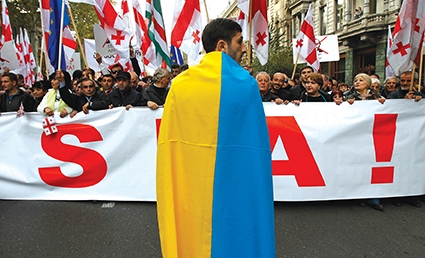What Happens to Ukraine Matters in Georgia
Op-Ed
Regardless of the distance between the two countries, what happens in Ukraine militarily and economically matters significantly for Georgia. It is nothing new to note that Ukraine and Georgia pursue similar geopolitical aims of joining western political and military alliances, and confronting the resurgent Russia’s. Both need western economic as well military support. However, since for the moment it is Ukraine not Georgia which is in the spotlight of world affairs because of the ongoing low-level fighting in east Ukraine, whatever the West does in in this country will have an impact on Georgia and the wider former Soviet Union.
On August 24, the United States Secretary of Defense, James Mattis, visited Ukraine in what was the first such trip by a head of the Pentagon in a decade. Mattis’ presence at the commemorative military parade in Kyiv, in which troops from several states took part, bore special political-military significance.
The US has recently been keen to make it clear that the country will continue its support for Ukraine’s independence and sovereignty. At the same time, the Ukrainian side looked forward to the possibility of new opportunities to strengthen its self-defense capabilities. The key topic of discussion during Mattis’ negotiations with Ukraine’s president Petro Poroshenko and Defense Minister Stepan Poltorak was the possibility to supply Ukraine’s military forces with defensive weapons. Both countries later announced that important agreements on expanding military cooperation had been reached, including in the fight against cyber threats and electronic warfare (EW) asset transfers.
No further details were provided, but it is important to monitor every move on that front. I have written on several occasions why Ukraine matters geopolitically and why the crisis in the country’s east, Donbas, is essentially insoluble. The West has been successful in managing the Russian threat in Ukraine. It is true that Moscow could ramp up its efforts and heavy fighting might occur, but if we look at the broader picture, it is clear Russia has failed on several major fronts when it comes to Ukraine. Now the West is thinking about providing lethal arms to Kyiv. From a strategic point of view, it will be a very difficult decision to make, but open discussion is already a win for the West.
Yet another victory for the western countries is their ability to block Putin’s efforts to bargain the Ukraine crisis (and not only) with Russia’s Syrian involvement. With its initial military engagement in 2015, the Kremlin hoped that by gaining momentum on the Syrian battlefield, the West would become more amenable in its support for Ukraine and there might have been a certain bargain.
Beyond Syria, Moscow has also been building its position in other conflict zones such as Libya, Afghanistan, and North Korea. There has been a string of reports of Russians supporting militarily the Taliban in Afghanistan; Moscow has also been quite vocal about the ongoing nuclear standoff on the Korean peninsula. Even in Libya, Russia has been careful to slowly build its negotiating position through holding regular meetings with high officials.
Looking from above at all these Russian actions, the Kremlin’s intention is clear: to gain as much political leverage as possible in a wide variety of conflicts around the world to influence/weaken the West’s negotiating position in the most crucial theater for Russia: Ukraine. However, the chances of this strategy working remain doubtful as the West has so far successfully blocked Russian initiatives around Syria. Moreover, Western resolve is also borne out by the recently ramped up pressure on Russia. For example, the US introduced new sanctions in August, while various reports indicate that the European Union will likely extend its own measures against the Kremlin and Russian state companies in late 2017-early 2018. In addition, Washington now openly talks about providing lethal arms to Kyiv and holds regular military exercises on the Russian periphery from Moldova to the South Caucasus.
Taking in consideration the whole picture, it is thus more than likely that the Russian and Western imperatives around Ukraine will remain paramount in the near future. Geopolitical interests will once again limit any diplomatic breakthroughs in east Ukraine, while the Russian moves to bargain its involvement in Syria or other emerging conflicts such as Afghanistan, North Korea or Libya in exchange for Ukraine will be blocked by Western powers.
Emil Avdaliani
Photo source: sbs.com.au












